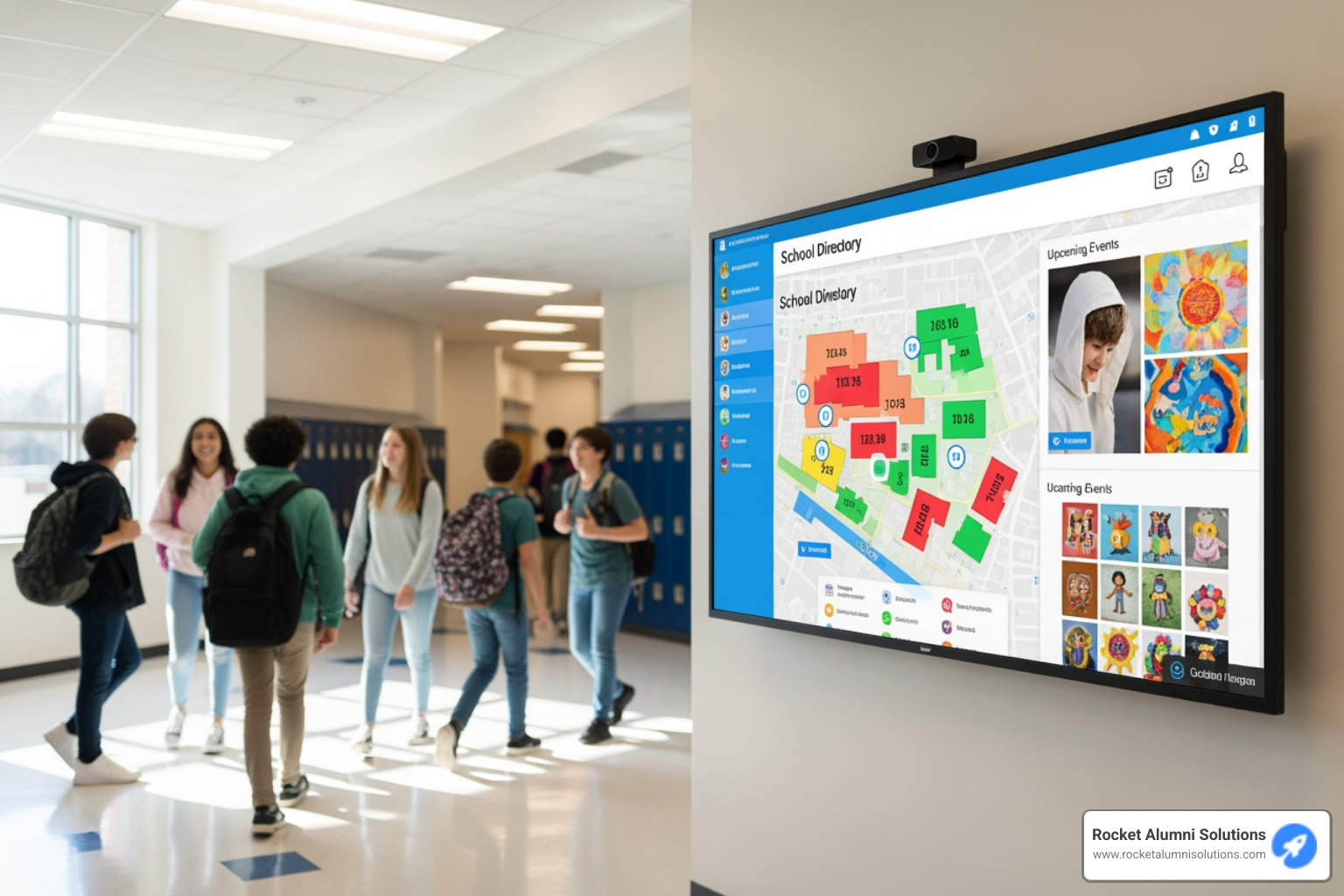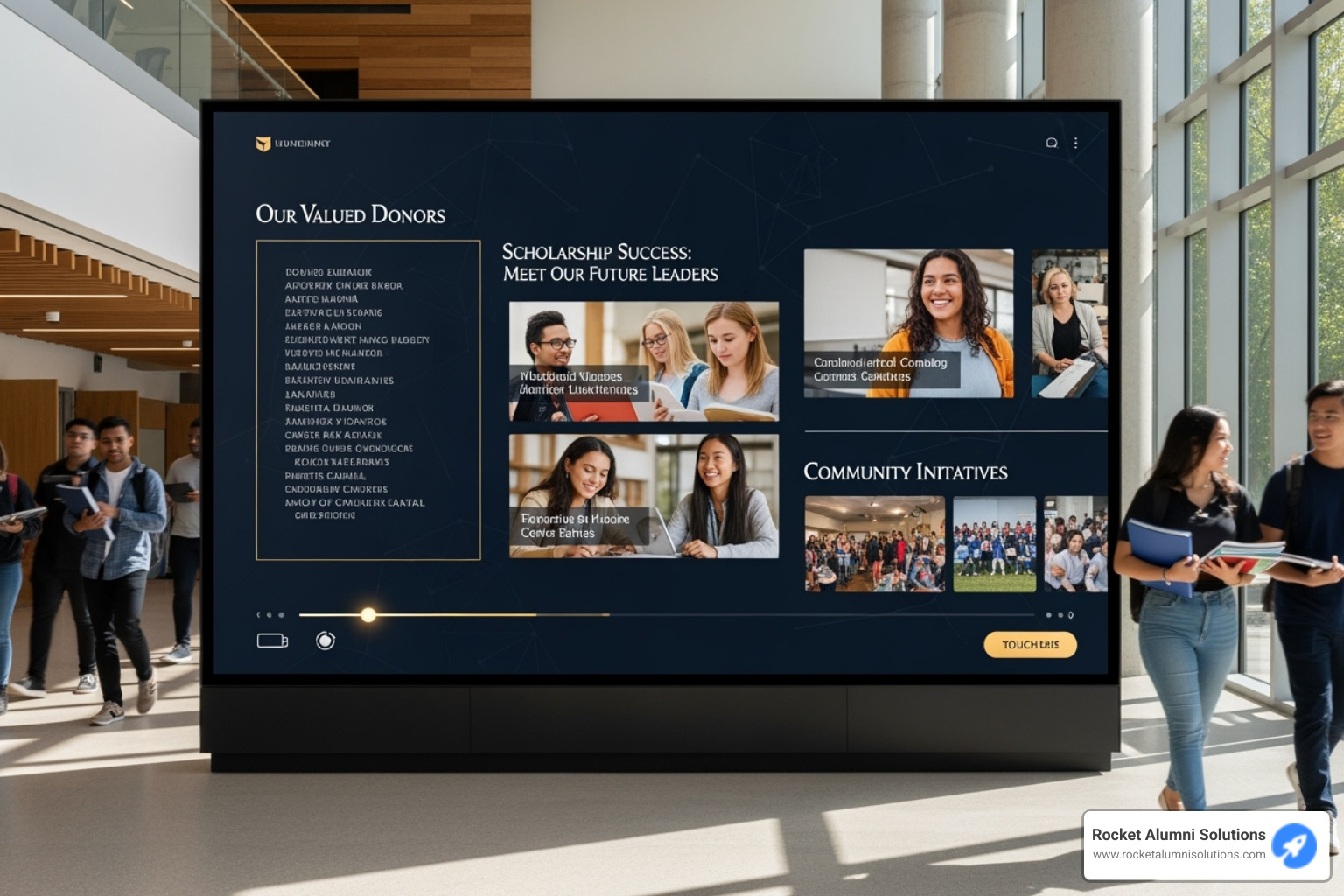Why Recognition Event Planning Matters More Than Ever
Recognition event planning is the process of designing and executing events that celebrate achievements and contributions within your organization. Effective planning involves defining clear objectives, knowing your audience, budgeting strategically, choosing the right format, personalizing the experience, and measuring success.
The traditional awards banquet is a thing of the past. Today's most successful organizations create memorable experiences that truly resonate with their people.
The numbers show why this shift matters. 63% of employees who feel recognized are unlikely to look for a new job, while organizations with recognition programs see 14% higher engagement, productivity, and performance. Furthermore, 79% of people who quit cite lack of appreciation as a key reason for leaving.
But these events are about more than statistics; they're about creating moments that make people feel genuinely valued. When done right, these celebrations become the stories employees share with their families and remember for years.
The challenge for many administrators isn't knowing why recognition matters, but how to create fresh, impactful events without breaking the budget.
I'm Chase McKee, Founder & CEO of Rocket Alumni Solutions, where I've helped hundreds of organizations transform their recognition approach. My experience in recognition event planning shows that the best events combine strategic thinking with creative execution to build a lasting culture of appreciation.
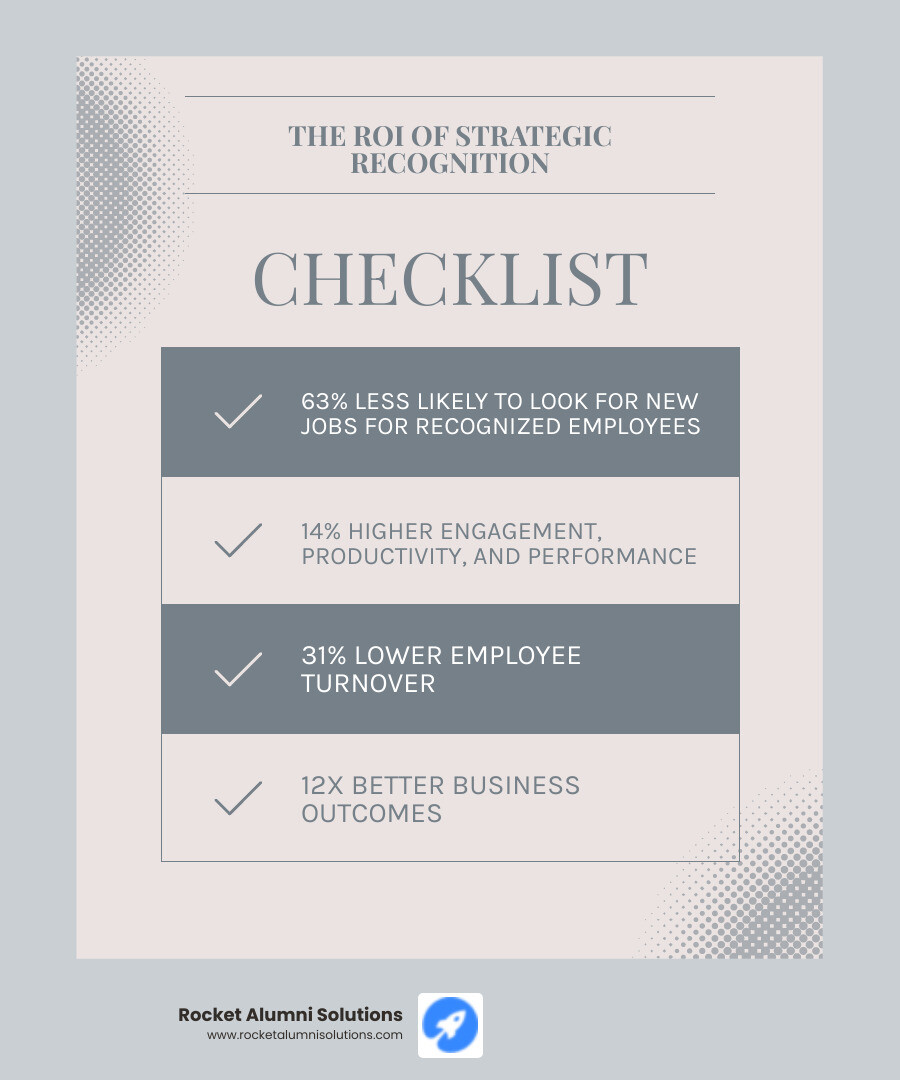
The Foundation: Strategic Planning for a Memorable Event
Effective recognition event planning requires a solid blueprint. Before choosing themes or entertainment, you must lay a strategic foundation that makes everything else shine.

Start with your "why." Define the event's purpose. Your purpose shapes every decision. To encourage innovation, spotlight creative problem-solvers. To promote teamwork, celebrate collaborative wins.
Here's what makes this planning phase so powerful: organizations with recognition programs see 14% higher engagement, productivity, and performance. That's a game-changer for your workplace culture.
Know your audience. A formal dinner might suit executives, while a casual party may be better for your customer service team. Tailoring the event to your audience ensures it will resonate.
Align everything with your company values. When you celebrate achievements that embody your core values, you show everyone what success looks like in your organization. If integrity matters, create an award that highlights ethical decision-making. If customer focus is key, celebrate those who go above and beyond for clients.
Budget wisely. Plan for key costs like venue, catering, and awards. Be intentional with every dollar to build lasting appreciation without overspending.
Ensuring Your Event is Inclusive and Celebrates Diversity
An inclusive event is essential to make every team member feel valued and that they belong. When people see themselves reflected in your celebrations, they know they belong.
Think accessibility first. Choose accessible venues and ensure everyone can see and hear presentations. These details matter.
Celebrate achievements from every corner of your organization. Recognition shouldn't be an exclusive club. Look for contributions from different departments, roles, and backgrounds.
Be culturally thoughtful. Be mindful of diverse cultural norms and preferences to accept the richness of your team.
The goal is simple: every person at your event should feel like they belong and that their unique contributions are valued.
Setting a Realistic Budget and Measuring ROI
Budgeting for recognition event planning requires a systematic approach to spending and measuring ROI.
Start by itemizing everything. Get quotes for venue, catering, awards, entertainment, and decorations. Always build in a 10-15% buffer for surprise expenses. 50% of workers would accept a pay reduction for personalized perks, meaning thoughtful recognition often matters more than expensive recognition.
To measure success, track what matters most:
Post-event surveys gauge immediate sentiment and feelings of appreciation.
Retention rates show the real impact on your bottom line. Companies with strong recognition strategies see 31% lower turnover.
Engagement scores can show improvements in feeling valued. Employees who value recognition are 3.7 times more likely to be engaged at work.
Productivity trends can also improve, as teams that feel recognized often show improved performance.
By tracking these metrics, you're making strategic investments in your people that pay dividends long after the event.
With a strategic foundation, you can design the experience. Recognition event planning offers options from formal galas to intimate team celebrations.
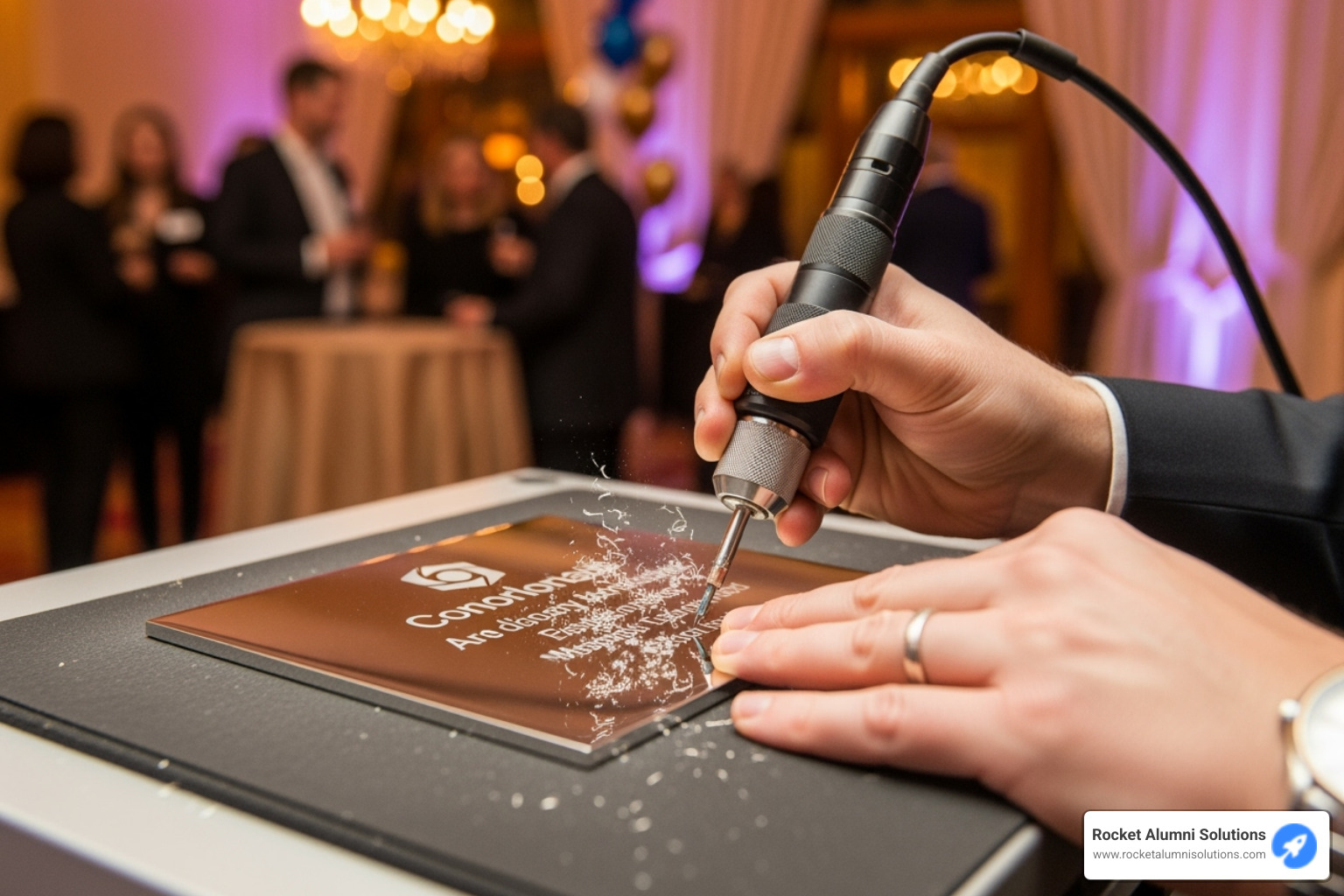
Match the format to your audience and goals. Formal events like galas are great for major milestones, bringing a sense of grandeur. On the other hand, informal celebrations, like team lunches or happy hours, build daily connections and make appreciation feel natural.
Create emotional resonance through authentic storytelling. Sharing the real story behind an achievement—the challenges and triumphs—makes the moment unforgettable.
Interactive engagement is key. Use photo booths, live polling, or hands-on activities to keep the audience invested and energized. A thoughtful venue selection connected to your culture can also lift the event.
Most importantly, every detail should feel authentically connected to your company culture, making the event uniquely yours.
Creative and Unique On-Site Recognition Ideas
Move beyond the predictable. Experiential rewards deliver nearly 4x more impact on the employee experience than traditional gifts.
- Offer experiences like a local wine tasting, concert tickets, or a unique travel opportunity. These create lasting stories.
- On-site personalization services, like calligraphy or hand-painting, turn a simple gift into a treasured keepsake.
- VIP treatment means being thoughtful, not expensive. Offer exclusive access, a special reception, or ride credits to show you care.
- For unique awards, be creative. Like the Dundies from "The Office," make them personal and meaningful to the individual.
- Offer practical services like professional headshots or tech help to show you understand employees' daily needs.
- Themed events and interactive activities can transform your celebration, but choose themes that reflect your team's personality.
How to Personalize Recognition for Maximum Impact
Personalization is where recognition event planning becomes powerful. 66% of employees prefer personalized rewards over generic ones, and it goes beyond just a name on a plaque.
Custom awards and gifts should reflect the individual. A book by a favorite author or equipment for a hobby shows you truly know them.
Personalized speeches make moments memorable. Share specific stories of their contributions to make the recognition feel genuine.
Incorporate individual stories through short videos or testimonials to show the real impact of their work and inspire others.
Research shows that 50% of workers would accept a pay reduction for personalized perks, proving people value experiences custom to their interests. When you take time to understand what matters to each person, recognition transforms from a routine gesture into a powerful relationship-builder.
The Role of Technology in Modern Recognition Event Planning
Technology has revolutionized recognition event planning, making events more efficient, engaging, and memorable.
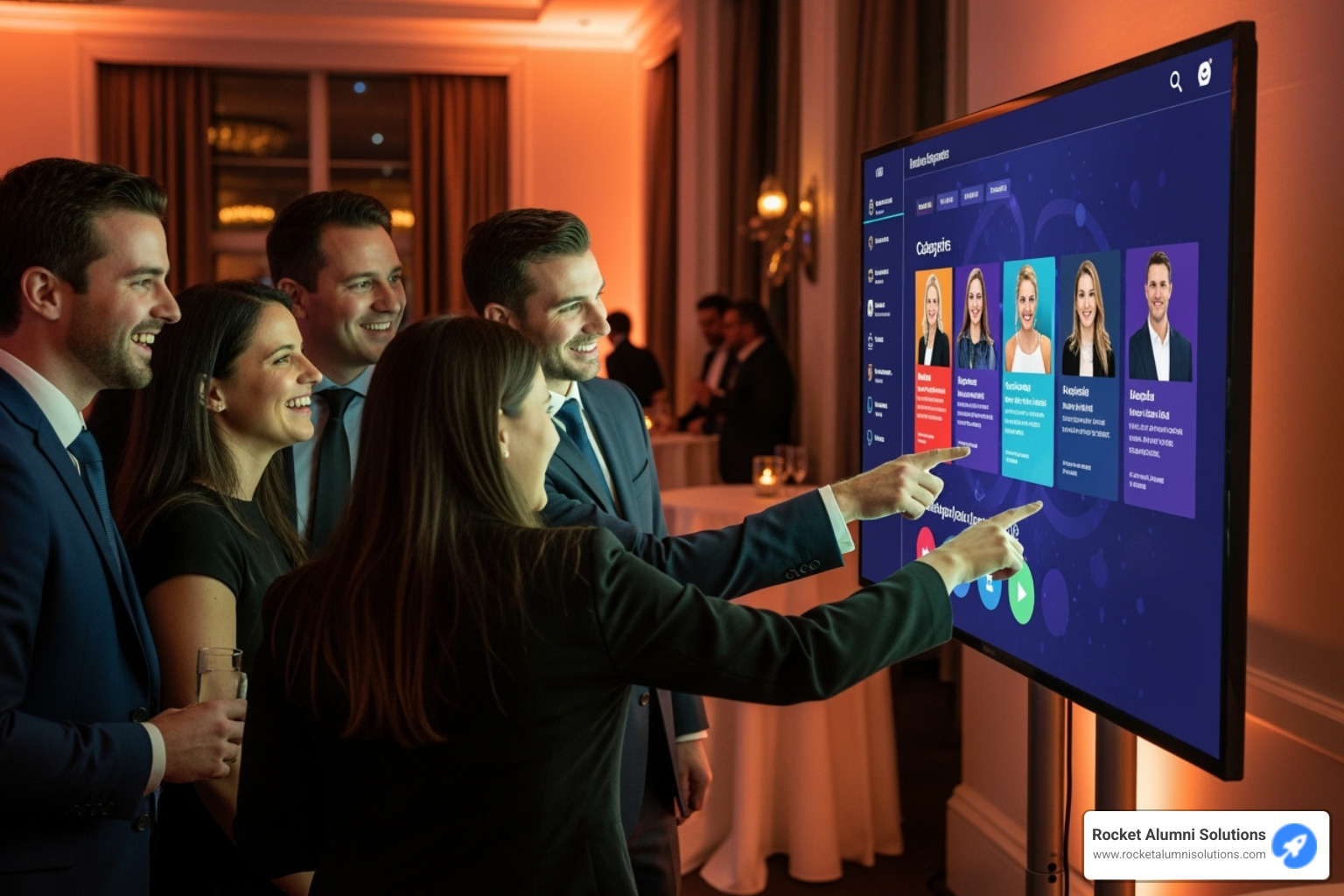
Event management software simplifies logistics like RSVP tracking and guest communication. Dedicated apps and email campaigns keep attendees informed. On-site, tech improves the experience. Live polling, social media walls, and digital photo booths boost engagement. Advanced visuals like projection mapping create stunning backdrops, while reliable AV equipment ensures a smooth event.
Leveraging Digital Displays for Lasting Recognition
Technology also creates lasting recognition, and digital displays are a prime example, turning static awards into dynamic experiences. A digital hall of fame or trophy case can showcase achievements interactively, preserving organizational history with photos, videos, and narratives that visitors can explore.
At Rocket Alumni Solutions, we specialize in providing digital recognition and display solutions for educational and athletic communities. Our customizable, tech-free media content offers features like animated flip books and digital yearbooks, bringing history to life. We integrate social media and mobile accessibility tools, ensuring that recognition is not only displayed prominently but also easily shareable and viewable on personal devices. This extends the lifespan and reach of recognition far beyond the event itself.
Want to see how these innovative solutions can transform your recognition efforts? Explore more info about digital award showcases and imagine the possibilities for your organization.
Best practices for virtual and hybrid recognition event planning
With remote work, virtual and hybrid recognition event planning is essential to ensure all attendees feel equally valued.
For virtual events, use interactive platforms with breakout rooms and polls. Send "event boxes" with snacks or props and use digital gift delivery to create a shared, engaging experience.
For hybrid events, ensure an equitable experience with high-quality AV and a dedicated moderator for the virtual audience. Use interactive tools like shared whiteboards or live Q&A to bridge the physical and virtual gap, avoiding a "two-tiered" feel. The key is to design activities that allow for meaningful interaction from everyone.
Beyond the Event: Creating a Year-Round Culture of Appreciation
Recognition event planning is powerful, but the real magic is an everyday culture of appreciation, not just an annual event. A consistent, daily appreciation culture is what builds the strongest relationships.
Peer-to-peer recognition programs are game-changers. When employees can celebrate each other, appreciation flows from all directions. In fact, 90% of workers say that values-based, peer-to-peer recognition makes them more satisfied with their work. This shows that people crave authentic acknowledgment from their teammates.
Spot awards are perfect for immediate recognition of incredible moments, capturing the impact while it's fresh. Simple gestures like shout-outs in meetings or handwritten notes are also powerful.
Communication keeps momentum. A recognition calendar can tie appreciation to events like International Women's Day or World Health Day. The key is making recognition feel consistent and authentic.
However, there are common pitfalls to avoid:
- Lack of personalization: Generic gifts feel hollow. A thoughtful, personalized item shows you care more than a costly, generic one. Thoughtfulness matters more than price tags.
- Poor communication: If the "why" behind recognition is unclear, the program loses credibility. Be transparent to build trust.
- Inconsistent recognition: Appreciation should be proactive and regular, not just a reaction during annual reviews or when an employee might leave.
- Focusing only on superstars: Recognize all types of contributions, from top performers to the steady team members who provide crucial support. Inclusive recognition prevents others from feeling invisible.
Building a year-round appreciation culture takes commitment, but it's worth the effort. When people feel genuinely valued every day, you see real change in engagement, loyalty, and workplace happiness.
Frequently Asked Questions about Recognition Events
Here are answers to common questions about recognition event planning, from budget concerns to measuring impact.
How do you make a recognition event fun and engaging?
Making a recognition event engaging is about creating connection, not spending more money. A simple pizza party can become legendary because of how it made people feel.
- Use interactive elements: Try live polling, activity stations, or a digital photo booth instead of endless speeches.
- Pick an authentic theme: Choose a theme that reflects your team's personality, like a game show or art gallery concept.
- Find the right host: A great MC transforms the energy. This could even be a funny team member who knows the group well.
- Incorporate personal stories: Reference inside jokes and shared experiences to create a memorable emotional connection.
- Offer experiential rewards: A team cooking class or tickets to an event create more lasting memories than another physical gift.
How can we recognize employees with a small budget?
The most meaningful recognition is about thoughtfulness, not cost.
- Handwritten notes: A personal note from leadership is powerful and costs almost nothing.
- Peer-to-peer systems: A simple shout-out board or weekly email allows colleagues to celebrate each other, multiplying impact without increasing the budget.
- Simple celebrations: A team potluck or surprise dessert cart can be very effective.
- Time-based rewards: An extra day off or a flexible work schedule is often more valuable than money and costs little.
The key is making it personal and specific. When you acknowledge exactly what someone did and why it mattered, even the smallest gesture carries weight.
How do you measure the success of a recognition event?
Measuring the success of recognition event planning means understanding its impact on your people and culture.
- Post-event surveys: Ask if attendees felt appreciated and connected to the company's mission, not just if they had fun.
- Engagement scores: Track scores before and after events, looking for improvements in metrics like "feeling valued."
- Retention rates: Monitor turnover over the long term to see the impact on loyalty.
- Productivity metrics: Look for positive performance trends in recognized teams.
- Qualitative feedback: Use focus groups or informal chats to gather stories and understand the deeper, personal impact of your efforts.
The goal isn't just to prove your program worked—it's to learn how to make it even better next time.
Conclusion: Building a Lasting Culture of Appreciation
Effective recognition event planning is about more than just a party; it's about creating experiences that make people feel genuinely valued.
Thoughtful recognition has deep strategic value. It strengthens teamwork, reinforces company values, and builds a culture that improves retention. The fact that 63% of recognized employees are unlikely to seek new jobs proves its power.
Your planning efforts create lasting ripple effects. These moments foster a sense of belonging and loyalty that is priceless, becoming stories employees remember and share.
My encouragement is to be creative and authentic. Whether using unique on-site experiences, crafting personalized awards, or leveraging modern digital displays, authenticity always trumps budget. People know when recognition is heartfelt.
The best programs blend strategy with genuine care, understanding that a culture of appreciation is built on consistency, not a single perfect event. It's about consistently showing people that their contributions matter.
As you move forward with your recognition efforts, consider how digital solutions can help preserve and amplify these important moments. Transform your awards program with a modern digital showcase that keeps achievements alive and accessible long after the applause fades. After all, great recognition deserves to be remembered and revisited for years to come.


















































































































